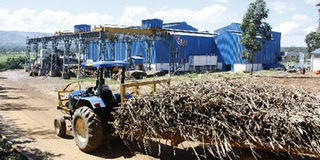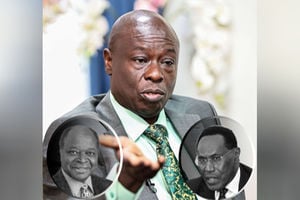Licensing of Butali raises legal queries

Tractors transporting canes to Butali Sugar Mills in Kakamega county.The General manager Mr.Sohil Patel says that due to heavy rains, they have a lot of sugarcane yields from farmers that has benefited the firm leading to increase in payment of Ksh.4300 per tone making Butali to be the highly paying firm in the county.
What you need to know:
- A sugar firm at the centre of a fierce battle for raw materials by millers in western Kenya may have been licensed unprocedurally, documents in our possession show.
- “In view of the above, the proposed Butali Sugar Mills project is not considered for registration in western Kenya,” said the technical report.
- Butali Sugar has been dogged by controversy both before and after its registration characterised by court battles, suspensions, and even dismissal of KSB officials.
A sugar firm at the centre of a fierce battle for raw materials by millers in western Kenya may have been licensed unprocedurally, documents in our possession show.
The papers indicate that the current Kenya Sugar Board (KSB) top brass ignored earlier directives and allowed the miller to start business in an area it was not supposed to be located.
Butali Sugar Company was controversially licensed in 2011 after two previous applications had been declined by the former board.
The industry regulator had denied the miller the go-ahead on grounds that the Sugar Act requires millers to be at least 40 kilometres apart.
In June 2004, KSB, under then chief executive Andrew Otieno, turned down Butali’s licence request as it would be barely 10 kilometres from West Kenya Sugar Company.
“The proposed location of your facility lies within a radius of 10 kilometres of an already existing miller and that may have adverse effects,” reads the letter from KSB.
The regulator noted that the mill would cut into the zone that supplies cane to the existing West Kenya Sugar Company since it had not presented its source of raw materials.
The Butali sugar management applied again for a licence in 2005 and KSB’s technical committee once again advised against it.
According to KSB licensing procedure, cane development is a pre-requisite for approval of any proposed mill and it must be done prior to consideration for registration.
The KSB technical team found that Butali had failed to consider the procedure and thus was unfit to be given a permit.
Mr Otieno, however, advised the miller to seek an alternative location.
“In view of the above, the proposed Butali Sugar Mills project is not considered for registration in western Kenya,” said the technical report.
In March 2005, then Agriculture permanent secretary James Ongwae wrote to Mr Otieno seeking to know why Butali had been denied registration.
Mr Otieno responded, reiterating the industry regulator’s stance that granting the miller a licence would amount to contravening laid down procedure.
Reached for comment, KSB chief executive Rosemary Mkok said the 40-kilometre rule has widely been misunderstood.
“The licence was granted on grounds of findings by a technical committee appointed by former Agriculture minister Kipruto arap Kirwa,” she said.
The committee, she noted, established that Kabras area could support two millers with a combined crashing capacity of 8,000 tonnes a day.
“Kenya Sugar Board interprets the 40-kilometre rule as farmers not being more than 40 kilometres away from any miller,” she explained noting that the board would soon reduce this to 20 kilometres.
Battle between millers
The parliamentary committee on Agriculture is currently investigating the cause of the now three-year-old nasty raw material battle between millers in the area.
Already the committee led by the Mandera MP, Mr Aden Mohammed, has raised questions over the registration of Butali, threatening to overturn it.
When the miller’s management appeared before it, the committee ordered it to submit documentary evidence of its registration.
“We will examine carefully the procedure used and if the findings show that the licence was issued irregularly, then it will have to be cancelled,” said Mr Mohammed.
Butali Sugar has been dogged by controversy both before and after its registration characterised by court battles, suspensions, and even dismissal of KSB officials.





